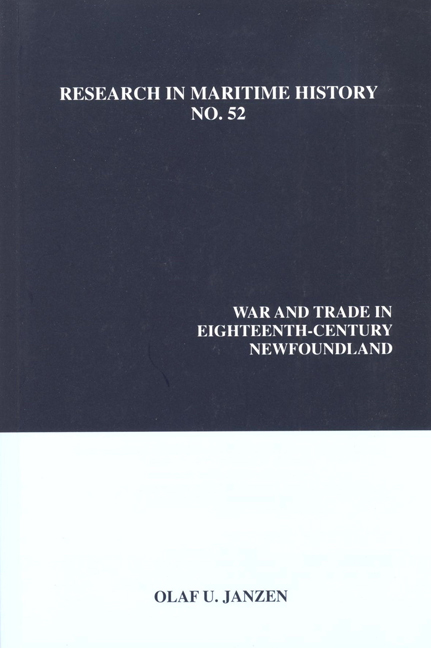Book contents
- Frontmatter
- Table of Contents
- About the Author
- Introduction
- “‘A World Embracing Sea:’ The Oceans as Highway, 1604-1815”
- “Of Consequence to the Service:' The Rationale behind Cartographic Surveys in Early Eighteenth-Century Newfoundland”
- “The Problem of Piracy in the Newfoundland Fishery in the Aftermath of the War of the Spanish Succession”
- “A Scottish Sack Ship in the Newfoundland Trade, 1726-1727”
- “'Une petite Republique' in Southwestern Newfoundland: The Limits of Imperial Authority in a Remote Maritime Environment”
- “The Illicit Trade in English Cod into Spain, 1739-1748”
- “Un Petit Dérangement: The Eviction of French Fishermen from Newfoundland in 1755”
- “The French Raid upon the Newfoundland Fishery in 1762: A Study in the Nature and Limits of Eighteenth-Century Sea Power”
- “Showing the Flag: Hugh Palliser in Western Newfoundland, 1763-1766”
- “The Royal Navy and the Interdiction of Aboriginal Migration to Newfoundland, 1763-1766”
- “The Royal Navy and the Defence of Newfoundland during the American Revolution”
- “The American Threat to the Newfoundland Fisheries, 1776-1777”
- Appendix
“The Royal Navy and the Defence of Newfoundland during the American Revolution”
- Frontmatter
- Table of Contents
- About the Author
- Introduction
- “‘A World Embracing Sea:’ The Oceans as Highway, 1604-1815”
- “Of Consequence to the Service:' The Rationale behind Cartographic Surveys in Early Eighteenth-Century Newfoundland”
- “The Problem of Piracy in the Newfoundland Fishery in the Aftermath of the War of the Spanish Succession”
- “A Scottish Sack Ship in the Newfoundland Trade, 1726-1727”
- “'Une petite Republique' in Southwestern Newfoundland: The Limits of Imperial Authority in a Remote Maritime Environment”
- “The Illicit Trade in English Cod into Spain, 1739-1748”
- “Un Petit Dérangement: The Eviction of French Fishermen from Newfoundland in 1755”
- “The French Raid upon the Newfoundland Fishery in 1762: A Study in the Nature and Limits of Eighteenth-Century Sea Power”
- “Showing the Flag: Hugh Palliser in Western Newfoundland, 1763-1766”
- “The Royal Navy and the Interdiction of Aboriginal Migration to Newfoundland, 1763-1766”
- “The Royal Navy and the Defence of Newfoundland during the American Revolution”
- “The American Threat to the Newfoundland Fisheries, 1776-1777”
- Appendix
Summary
When the War of American Independence began in 1775, one of the many dilemmas facing the Americans was how to make the British conscious of their threat. It seemed inconceivable to most British political and military leaders that the suppression of a colonial revolt would require a very determined or prolonged military effort. In 1774, Secretary of War Lord Barrington even predicted that, in the event of an American rebellion, the army would not be needed. “A Conquest by land is unnecessary,” he explained, “when the country can be reduced first to distress, and then to obedience by our Marine.” Lord North echoed Barrington's perception in 1775, although he conceded “that a Large land force is necessary to render our Naval operations effectual.” Few understood that the Patriot leadership enjoyed widespread sympathy and support, or that the Americans would be less concerned with trying to secure a military victory over the British than a political one. This entailed exerting sufficient pressure on the British government to cause it to abandon its efforts to crush the rebellion and accept instead a negotiated settlement. Towards this end, the political leadership of the American cause made the destruction of the British fishery at Newfoundland one of their earliest objectives. In so doing, they reminded the British that the stronger power did not necessarily have the ability to dictate the course of a war.
The Newfoundland fishery made an excellent target. It was widely regarded throughout the North Atlantic community as one of Great Britain's most important national assets. The wealth it generated was later estimated to have had a value in 1769 of £600,000, while the fishery's function as a “nursery for seamen” made it, according to the conventional wisdom of the day, an essential component of British seapower. To ensure that the commercial and strategie value of the fishery remained with the mother country, it was official British policy to preserve its migratory character. The defence of overseas British possessions had traditionally been based upon the maintenance and exercise of naval power in metropolitan waters. Because this conformed perfectly with British fisheries policy, hardly anything was done to provide Newfoundland with local defences.
- Type
- Chapter
- Information
- War and Trade in Eighteenth-Century Newfoundland , pp. 193 - 214Publisher: Liverpool University PressPrint publication year: 2013

